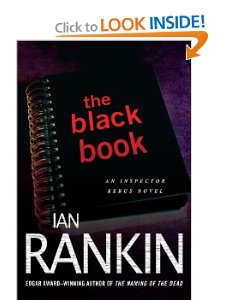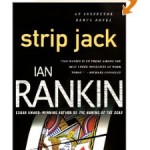When is a cold case a hot case? When the cold case involves a fire that burned a landmark hotel to the ground. Bad enough in itself, but in the ruins was an unrecognizable charred body… who did not die from the fire, but from being shot in the head. And of course this is precisely the sort of unresolved problem bound to drive an OCD detective like John Rebus nuts… until he solved the case, a case that involves a policeman’s black book, a brewery owner’s secret diary, a thug of monumental proportions known as Ger Carrerty, John Rebus illegally obtaining a weapon, which turns out to be the murder weapon from the Central Hotel shooting… and much more. Ian Rankin knows what he is doing when he writing a crime thriller, and he has carved out his own niche by making Scotland and in particular Edinburgh the epicenter of his story telling. It’s a real treat… and it doesn’t involve haggis either!
My interest in this series of novels, of which this is the fifth volume, is not just in the plot or svelte prose, but in the central character, John Rebus who is a Scottish Christian of sorts, though not much of a church going one. The novel involves interesting investigations into the man’s psyche and his faith.. he is a man with a conscience and not just any sort of conscience (driving his pursuit of justice and also mercy) but a specifically Christian one.
For example, Rebus is taunted by Big Ger at one point in the story after they have both run a considerable distance uphill: “I bet even you’ve got a taste for pain…You’re hurting all over, but you ran with me and didn’t give up. Why? Because you like the pain. It’s what makes you a Calvinist.” (p. 191). Whether we agree or reject this characterization of Scottish Presbyterianism it does tell us a lot about Rebus. He does have a strong sense of ‘the OT God’ as the novels sometimes call God, and of fatalism for that matter ‘que sera sera…’ Or consider the following scenario after Rebus buys the gun…. then feels guilty and walks into a Catholic Church confessional booth in which the following exchange is heard:
“Forgive me Father, for I am about to sin.
“We’ll see about that son,” came a gruff Irish voice from the other side of the grille. There was such assurance in the voice, Rebus almost smiled. Instead he said, ‘I’m not even Catholic.’
‘I’m sure that’s true. But you are a Christian?’
“I suppose so. I used to go to church.’
‘Do you believe?’
‘I can’t not believe.’ He didn’t add how hard he’d tried.
‘Then tell me your problem.’
‘Someone’s been threatening me, my friends, and family.’
‘Have you gone to the police?’
‘I am the police.’
‘Ah and now you’re taking the law into your own hands, as they say in the films.’
‘How did you know?’
‘You’re not the first bobby I’ve had in this confessional. There are a few Catholics in the police force.’ This time Rebus did smile. ‘So what is it you’re going to do?’
‘I’ve got a gun.’
There was an intake of breath. ‘Now that’s serious. Oh yes, that’s serious. But you must see that if you use a gun you turn into that which you despise so much. You turn into them.’ The priest managed to hiss this last word.
‘So what?’ Rebus asked.
“So, ask yourself this. Can you live the rest of your life with the memories and the guilt? The voice paused. “I know what you Calvinists think. You think you are doomed from the start, so why not raise some hell before you get there? But I’m talking about this life, not the next. Do you want to live in purgatory before you die?
‘No.’
‘You’d be a bloody eijit to say anything else. Tie that gun to a rock and chuck it in the Forth, that’s where it belongs..’
‘Thank you father.’
‘You’re more than welcome. And son?’
‘Yes, father?’
‘Come back and talk to me again. I like to know what madness you Prods are thinking. It gives me something to chew on when there is nothing good on the telly.'” pp. 226-27.
One of the most interesting things about Rebus is that Rankin bares the man’s soul, and we find a vulnerable, sometimes tender-hearted person, a Christian person of some sort who definitely believes. The thing that makes this whole scenario work of course is Scotland, with it’s strict gun control laws, laws that in the early 90s even involved policemen not regularly carrying guns, never mind any one else. It would be hard to imagine an American policeman in trouble with law for carrying a gun, and obtaining one illegally on the black market. But then America is Rambo land, not Scotland. I’ll let you figure out which is more civilized and better protects people from gun violence.
This series is truly remarkable, and I am very indebted to Larry Hurtado for pointing me in its direction. It’s made for some fun extra reading of the pleasure sort whilst here in Durham.














